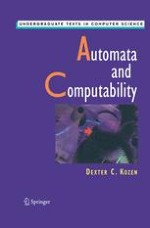1997 | OriginalPaper | Chapter
Pattern Matching and Regular Expressions
Author : Dexter C. Kozen
Published in: Automata and Computability
Publisher: Springer New York
Included in: Professional Book Archive
Activate our intelligent search to find suitable subject content or patents.
Select sections of text to find matching patents with Artificial Intelligence. powered by
Select sections of text to find additional relevant content using AI-assisted search. powered by
Here are some interesting and important questions: How hard is it to determine whether a given string x matches a given pattern a? This is an important practical question. There are very efficient algorithms, as we will see.Is every set represented by some pattern? Answer: no. For example, the set is not represented by any pattern. We’ll prove this later.Patterns α and β are equivalent if L(α) = L(β). How do you tell whether α and β are equivalent? Sometimes it is obvious and sometimes notWhich operators are redundant? For example, we can get rid of ∈ since it is equivalent to ∼(#@) and also to φ*. We can get rid of @ since it is equivalent to #*. We can get rid of unary + since α+ is equivalent to αα*. We can get rid of #, since if Σ = {α1, ..., αn} then # is equivalent to the pattern {ie44-2}.
